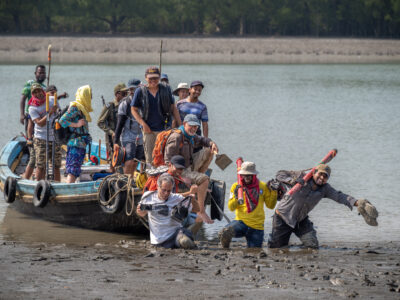Erik Assadourian of the Worldwatch Institute recently suggested that what with all the zombie books and movies coming out recently, Worldwatch’s next book should focus on zombies and sustainability, because it would draw more attention to the institute’s work than even the best written State of the World report could.

That got me thinking about the idea of zombies and water. Is there a hidden connection? Some aspect of the living dead that gives us insight into the world water crisis? Just what do we know about zombies and water?
I came up with a few thoughts.
According to the Federal Vampire and Zombie Agency, “Almost every significant zombie outbreak in the United States came on the heels of a hurricane, flood or blizzard,” which suggests to me a water link. Given that, according to the agency, the zombie virus (Mononegavirales, same family as Human Vampiric Virus) is caused by ticks from tropical climes (thus explaining the large number of outbreaks in those regions) it does not seem farfetched that there might be a water-zombie link.

However, I can find no definitive causal connection in the literature between water and zombies per se.
Several sources cite zombie aversion to water as a primary defensive strategy when dealing with zombie attacks. water remains a safe boundary against decomposing bone-biters.” Other sources, however, suggest avoiding shallow water in the event of a zombie attack, as zombies do enter water and can remain underwater indefinitely. (Deep water is okay – zombies are too stupid to swim).
Much of the rest of the literature on zombies and water is focused on the human need to secure fresh water in the event of the Zombie Apocalypse—not an easy task when infrastructure has broken down. It should go without saying that an important corollary to the Zombieland Rule #1 (Cardio) should be “Stay Hydrated.”

It seems to me, however, that we should not let our justifiable concern with zombies blind us to the dangers of other monsters and the general monster/water connection, which can be broken down into three general categories: 1) monsters that come from/live in/come out of water, 2) monsters/aliens/witches that are afraid of/killed by water, and 3) the Gremlins.

The first category contains so many examples that, quite frankly, it would be tedious to list them all. Flushed crockodiles, frankenfish, orca, jaws, anaconda, The Beast from 20,000 Fathoms, Leviathan, Moby Dick, etc. etc. To sum up: don’t go near the water. Really.

More rare are those cases in which water actually kills the monster. Most famously, there are the aliens from the movie Signs. In this movie, a wise/psychic little girl keeps filling up glasses of water and leaving them around the house, so that when the aliens finally attack, someone can throw water on them and kill them. Clearly this film is intended to highlight the importance of fresh water resources throughout the world, and illuminate the risk of alien attack once the world passes peak water.

Then there is the case of the Wicked Witch of the West, who melts horribly when Dorothy throws water on her. Does this mean that she never drank water? If so, is that why her voice cracked so much? Does lack of adequate hydration make one’s skin green? Is there a connection to anti-social personality disorder? These are all questions that call for more research.

Finally, there is one last case—the tale of that cute furry creature who multiplies when he gets wet. (He only turns into a monster if you feed him after midnight. Don’t feed him after midnight!) It seems to me that the central metaphysical theme of this film is that Water is Life! and that Life is Dangerous. Also, that the fitness gurus who say not to eat in the evening are correct, but not for the reasons they think.
In conclusion, there’s a lot to say about zombies and water but very little of it makes any sense. Also, don’t forget rule 1(a): Stay Hydrated.




You may want to look into the movie “The Faculty”- there may be a connection between the benefits of water consumption and Body snatcher aliens taking control of the Earth…. Just a thought for “research”
Nice article!!!! ;]